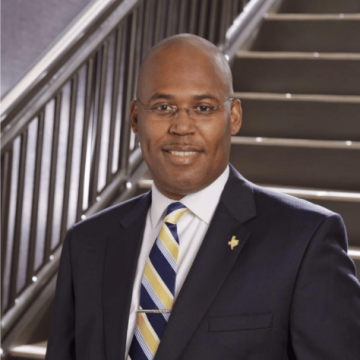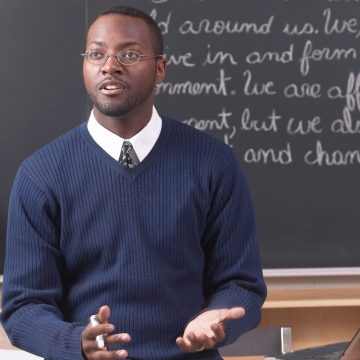Martin Haberman
Distinguished Professor
School of Education
University of Wisconsin Milwaukee
AERA Symposium
AERA April 2, 2002- New Orleans
I am pleased to have been invited to participate in this symposium today. AERA is dedicated to the generation and use of information as a basis for answering tough questions such as the one posed by today’s symposium organizers.
 As education professionals you know the importance of schools overcoming the income gap. According to Paul Loeb (Soul of a Citizen, 1999, p 87-88) families in the top 25% in income send 86% of their children to college while families in the bottom 20% send 4% of their children to college. There are clearly racial gaps, as well as language, early childhood experience, health, parent education, and school and class size gaps which undergird the achievement gap. Closing these gaps is essentially an issue of equity and justice not science. Before diverse students in poverty schools can achieve as much as advantaged ones, they need to be part of a society that does not believe giving them access to equal treatments and resources will hurt their own children or raise their taxes.
As education professionals you know the importance of schools overcoming the income gap. According to Paul Loeb (Soul of a Citizen, 1999, p 87-88) families in the top 25% in income send 86% of their children to college while families in the bottom 20% send 4% of their children to college. There are clearly racial gaps, as well as language, early childhood experience, health, parent education, and school and class size gaps which undergird the achievement gap. Closing these gaps is essentially an issue of equity and justice not science. Before diverse students in poverty schools can achieve as much as advantaged ones, they need to be part of a society that does not believe giving them access to equal treatments and resources will hurt their own children or raise their taxes.
Closing the gap is not a question of generating more fruitful hypotheses. There is already a solid knowledge base, generated by many people in this room, explaining why there are successful individual schools serving diverse children in poverty operating in the midst of failing districts. Teacher educators are witnesses, sometimes insightful ones, to life in schools. But they reflect rather than shape that reality.
The achievement gap is not an aberration of American society nor is it an unintended consequence. Quite the contrary. It reflects the will of the overwhelming majority of Americans who believe that education is a personal not a common good and that the highest quality education is a scarce resource. Schooling is the means we use to produce winners and losers. Who gets into the prestigious colleges is the critical question at the top achievers’ level. Who goes to the other colleges or to post secondary institutions reflects the competition at the next levels down. Who gets training for a decent job or any job at all is the next level and so on. When we get to the poor and diverse children in urban schools the lofty mission of advanced knowledge, citizenship and self actualization we want for our children has been narrowed down to get a job and stay out of jail. At this lowest level of the bottom half there is no longer any competition for a future of any substantial value. We can now speak of “success for all” and “all children can learn.” Jobs involving fast food or making beds are not a scarce resource.
School systems state goals as universals but their actual work is sorting students not equalizing their opportunities to learn. Understanding that teacher education, like the public schools, reflects rather than shapes American society is basic to any discussion of removing achievement gaps. As in other exploitive situations, most of the parents of the 14 million diverse children in poverty in the 120 largest school districts and in poor rural areas honestly believe that their schools are treating their children fairly. In my own city we tolerate a high school which had 18% graduate last year in a district that has an overall 36% high school graduation rate for African Americans, which is a higher rate than many other urban districts. Thirty six percent is an interesting figure since that is the percent estimated by some historians for the number of slaves who taught themselves to read when to do so was a serious crime. The function of public schools in urban districts is to maintain the bottom half. Urban schools function as custodial institutions rather than as places where learning is the primary activity. The “pedagogy” offered is these “schools” is a set of cultural rituals that bears no resemblance whatever to the knowledge base in teaching and learning.
So my short answer to the question posed by this symposium is “No.” I have seen little to suggest that teacher education seeks to or can contravene society’s intentions and close an achievement gap that is purposeful. But I would not be working so hard or joining you today if I did not believe that teacher education should and can find ways to answer “Yes” to this vital question.
For 43 years I have been directly involved with developing and offering teacher education programs for diverse children in poverty schools. In recent years I have, along with selected colleagues and constituencies, taken effective elements from various teacher education programs and combined them into demonstration models. We have turned individual failing schools into effective ones but have not thus far, been able to use teacher education to close the gap in an entire school district. While the urban districts are hosts to and surrounded by hundreds of teacher education institutions preparing more and more teachers, these districts have more teachers who quit or fail, increasing teacher shortages and a stable, significant achievement gap which resists marked improvement. And since a career in teaching is now approximately only 11 years long in states serving the majority of low income students, the shortage is here to stay. In my own city of 6,000 plus teachers we hire 6,000 new ones every six years. In reconstituted schools in Houston and in Buffalo we have demonstrated that if we can select a faculty of beginning and veteran teachers the achievement gap can be closed in one year. The fact that we have closed the gap in specific schools by connecting these schools to a specific teacher education model gives me hope that changing a total urban district is also possible. To explore what I believe can be done, I’ve selected three questions out of a dozen or more critical ones that are key if teacher education in America is to impact the gap. They are:
Who should teach?
What must they be prepared to do?
How can we evaluate success?
Who Should Teach?
The program development and studies I have pursued convince me that in preparing teachers for diverse children in poverty selection is more important than training. If I were to put a relative weight on it I would estimate that selection is 80% of the matter. This does not mean that college courses, student teaching and inservice workshops are always a waste of time or cannot help participants learn new concepts and behaviors. If offered to the people these traditional formats can be beneficial: how beneficial depends mainly on those selected and somewhat on the knowledge and teaching know-how of the instructors. Given inappropriate students, interns or beginning teachers, however, traditional teacher education modalities will teach little to and change less about the participants. Indeed, selecting the wrong candidates then using the traditional instructional modalities will make participants worse by deepening their prejudices and providing them with a database of experiences on which they can more firmly build and strengthen their stereotypes and misconceptions.
The most efficient ways of recruiting and selecting the wrong people at the initial teacher preparation level i.e. those who will never take positions teaching diverse children in poverty or who will quit or fail if they deign to try-are the criteria most commonly used: a composition on why I want to teach, G.P.A., letters of reference, a basic skills test, etc. These irrelevant criteria are frequently used in traditional and alternative certification programs. Actually, undergraduate GPA does predict. If it is extremely high in courses outside of education it predicts quitting and failure.
The explanation for the power of selection is certainly not new and not limited to teacher education. In 1890 Henry James in Psychology of the Mind explained how we take in and make sense of the world by a process of selective perception. This construct explains much about the lifelong strengthening of belief systems which account for and predict behavior. The various disciplines dealing with human behavior that have burgeoned over the last century have produced a variety of theories that seek to explain the sources and development of the pre-dispositions which control the ways in which we take in our world. Selective perception is always hard at work feeding our belief systems and predisposing us to act in particular ways.
A simple example here will explain how this theory plays out in teacher education. For several years we brought full-time undergraduates from small towns and suburbs into Milwaukee for field work in poverty schools. Before beginning their experiences we asked them to write what they expected to find about the children, the teachers, the principal, the curriculum, the school and the parents. At the end of the period we asked them what they actually found using the same categories. Each of their comments was coded as a negative, positive or neutral expectation. Those who expected to see discipline and management problems, uncaring parents, burned out teachers and an irrelevant curriculum saw those things with great clarity, in detail and with great personal meaning. For them the direct involvement was a confirming experience that the urban schools were as bad as they had imagined they would be. For those who were predisposed to see students able and ready to learn, creative teachers, a supportive principal and caring parents, guess what they saw? But even more important than their written predictions and findings was how these teacher candidates differed in the ways they actually interacted with the children. Those with predominantly negative expectations simply could not relate to or connect with, or establish a caring, respectful relationship with the children. Their direct experiences merely confirmed their pre-existing belief systems. These are not one time results and have also been replicated with inservice teachers who maintained racial and other prejudicial stereotypes in the face of long term treatments by well intentioned teacher educators who tried to “guide” or “help them see and interpret” their experiences in new ways. Regardless of the different theoretical explanations for the development of our selective perception we know that they support belief systems that are lifelong, resistant to change by the trivial “treatments” used in teacher education programs and powerful in controlling the way in which teachers will act with children in schools. Teachers’ belief systems not only explain but predict their behavior with diverse children in poverty.
I have elsewhere described the content of the belief systems of star teachers vs. those of quitter/failures. In the interview we use to identify who will succeed, candidates’ responses are evaluated in terms of the degree to which their pre-dispositions to act resemble those of stars or quitters/failures. Quitter/failures can be quite articulate in explaining why they cannot continue to work with children who are physically and emotionally not ready to learn, in unsafe and nonconducive school climates, required to teach irrelevant curriculum unaligned to achievements tests, supervised by irrational principals, burdened by large classes, with inadequate materials and equipment, and buried in paper work from chaotic central offices. But stars, teaching in the same district, in the same building and with the very same children, are willing to assume responsibility and be accountable for their children’s learning even though they have no control over their working conditions, or the parents or the students’ out-of-school lives. Stars are like the air traffic controllers who cannot control the weather, the number of incoming planes, the pilot’s abilities, the maintenance of the planes, or any other factor that can cause an accident yet are willing to assume full responsibility for all take offs and all landings. It is this “irrational” responsibility and accountability which characterizes the pre-dispositions and selective perceptions of star teachers of children in poverty, who like air traffic controllers perceive school as a matter of life and death for clients who are typically unaware and unappreciative of their services.
It is hard for many teacher educators, as well as other faculty in higher education, to accept the likelihood that they are having little impact on their students’ pre-dispositions to act. In a long-term trial over a few years, undergraduate student teachers in a first rate teacher education program were directly taught stars’ pre-dispositions; in effect the faculty taught them the “right” ways to perceive. These students did not change their perceptions, beliefs or behaviors. Several dissertations have shown similar results. The literature in teacher education, however, does not reflect a knowledge or an appreciation of the stability of these pre-dispositions. I have refereed literally hundreds of studies of how preservice students’ perceptions and beliefs related to diverse students in poverty were supposedly changed in important ways simply and neatly: i.e. as a result of taking a course, or having a student teaching experience, or writing a reflection paper. Expectations that such trivial treatments can change the way students perceive or act reveals a serious gap in the knowledge base regarding the stability of selective perception and the nature of adult development.
What Must Teachers Be Prepared To Do?
The content of what teachers need to know and do has been a source of continuing debate for 175 years between advocates of subject matter only and those who also support professional content. For teachers of diverse children in poverty both realms are necessary but not sufficient conditions. There is a third realm dealing with the teacher’s ability to relate to and connect with children which determines whether subject matter and professional knowledge can be used. Without this ability to connect with children how much the teacher knows about math or the seven parts of direct instruction becomes moot. Quitters and failures do not leave teaching in poverty schools because they can’t divide fractions or do not know the characteristics of 13 year olds. They leave because they don’t want to be with those children in those schools and the children make it equally clear they don’t want them to be their teachers.
While some teacher educators appreciate that connectedness represents a realm of knowledge and skills, their tacit assumption seems to be that candidates who complete a program of preparation will somehow pick up relationship skills as some sort of ancillary by-product. Nothing could be further from the truth.
An example of how pre-dispositions interact with selective perceptions, beliefs and then actions can be seen in how quitter/failure teachers explain success in general and the success of their children in school. They explain success in terms of ability. The ability paradigm controls the way in which they perceive and explain life in their classrooms and schools. Star teachers believe in and use effort to explain success. They behave as if generating effort all day, everyday from everyone is the essence of the teacher’s job. These different belief systems shape and control how each group of teachers connects with and teaches their students. Quitters/failures define their work as planning and offering appropriate lessons. Stars spend their planning time identifying interest grabbing activities and materials and their teaching time trying to engage and activate diverse learners.
Perceiving and acting on the ability paradigm guarantees becoming a quitter/failure. While there is not space here to identify all the components of the knowledge base which comprise this third realm of connectedness and relationships, it is possible to characterize some of the selective perceptions which undergird its formation. Stars assume and cope with the fact that they and the children will have to operate in bureaucracies with irrational policies and insensitive people. Star teachers act as grease between the machinery of a mindless system and the needs of their children. They accept inclusion of students with disabilities. They believe parents/caregivers are resources. They work with health and human service workers involved with their children and families. They understand student development in terms of cultural and ethnic knowledge not only in terms of supposedly universal psychological stages. They know how to prevent and deescalate violence. They demonstrate respect and caring for students who may commit despicable acts. They network and learn from resources to help them problem solve. They maintain positive relationships with coworkers who lack their abilities and commitments. These and many other demonstrated behaviors are not part of preparation programs because they cannot be transmitted as subject matter or professional content can. But taken together they represent what I have come to see is a body of knowledge prerequisite to learning the content and methods for teaching effectively in diverse poverty schools. Closing the achievement gap can only be done by teachers with the knowledge and skills to interact with diverse students in meaningful ways.
The third realm of necessary knowledge for closing the gap deals with the question of how we evaluate teacher success.
How Can We Evaluate Success?
In the programs I work with the criterion we use for recommending that candidates be failed is children’s learning. When we fail an intern, we call them Resident Teachers because they are teachers of record in poverty schools, it is because the children in their classrooms are not learning. Our clients are not the teachers in training but the children and we cannot waste the time of real children in real classrooms.
Typically, failures cannot produce a series of work samples which convinces us that the children in their classrooms are achieving at a reasonable rate. There are no surprises in this activity. Once we observe Residents who are disconnected from the children we can predict with great reliability that the children will not be producing meaningful work which demonstrates progress. We inform the Residents that we can help them with lesson planning, organization skills, management systems and even subject matter gaps but we cannot teach them the relationship skills they lack. Quitter/failures frequently practice giving praise and making encouraging statements but unless such acts reflect a genuine connectedness these “rewards” have no positive effects on student behavior. Indeed, when a disconnect exists students feel rewarded by annoying or generating teacher reprimands. Without an undergirding connectedness teachers saying nice things is mere piffle.
The reverse of this situation also pertains. When we see teachers connected with and relating to children in positive ways we see the beginning of professional development for the Resident and genuine learning opportunities for children. There is no limit to how much and how quickly Residents with relationship skills learn about the nature of their students and the nature of teaching and learning. In extreme cases we have a few Residents whose abilities to connect are so highly developed that everything (anything) they do “works.” It becomes a challenge to their mentors to help them understand that their students will do even better once they learn how to teach.
When we commend Residents for a state license it is not because they have completed the program requirements but because the students in their classrooms are learning. We forward their names to the State not because they have successfully completed particular processes but because they have demonstrated their children’s learning despite mindless bureaucracies where most others quit or fail.
The responsibility of teacher educators to produce effective teachers for failed urban districts cannot be dodged by whining that the schools must change the conditions of work before we can prepare effective teachers. Extrapolating the trends of the last half-century it is quite likely that teaching conditions in urban schools will get even worse, not better. We know how to use powerful teacher education components to turn an individual failing school around. What we lack is the experience of using a teacher education model to transform an entire urban district. I hope that when the opportunities present themselves, the teacher education programs we implement will build on and extend what we know about selection and the beliefs and behaviors of star teachers whose children do learn.






